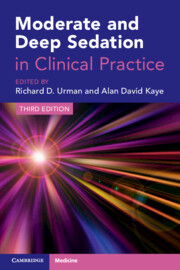Book contents
- Moderate and Deep Sedation in Clinical Practice
- Moderate and Deep Sedation in Clinical Practice
- Copyright page
- Epigraph
- Contents
- Contributors
- Preface
- Chapter 1 Introduction to Moderate and Deep Sedation
- Chapter 2 Pharmacology Principles in Sedation
- Chapter 3 Pain Assessment and Management Considerations
- Chapter 4 Patient Evaluation and Procedure Selection
- Chapter 5 Patient Monitoring, Equipment, and Intravenous Fluids
- Chapter 6 Credentialing, Competency, and Education
- Chapter 7 Quality, Legal, and Risk Management Considerations: Ensuring Program Excellence
- Chapter 8 Nursing Considerations for Sedation
- Chapter 9 Physician Assistants and Nurse Practitioners
- Chapter 10 High-risk Patients: Sedation Considerations in Coexisting Disease
- Chapter 11 Respiratory Compromise in Moderate and Deep Sedation
- Chapter 12 Management of Complications of Moderate and Deep Sedation
- Chapter 13 Recovery and Discharge After Monitored Anesthesia Care
- Chapter 14 Outcomes, Controversies, and Future Trends
- Chapter 15 Simulation Training for Sedation
- Chapter 16 Sedation in the Interventional Radiology Suite
- Chapter 17 Sedation in Endoscopy
- Chapter 18 Sedation in the Interventional Cardiology Suite
- Chapter 19 Sedation and Anesthesia for Interventional Pulmonary Procedures
- Chapter 20 Sedation for Ophthalmological Procedures
- Chapter 21 Procedural Sedation in the Emergency Department
- Chapter 22 Sedation in the Intensive Care Setting
- Chapter 23 Pediatric Sedation: Practical Considerations
- Chapter 24 Safety and Outcomes in Pediatric Sedation
- Chapter 25 Sedation in the Office and Other Outpatient Settings
- Chapter 26 Sedation in Dentistry
- Chapter 27 Sedation for Assisted Reproductive Technologies
- Chapter 28 Interventional Pain Management Procedures
- Chapter 29 Emergency Resuscitation Algorithms: Adults
- Chapter 30 Emergency Resuscitation Algorithms: Infants and Children
- Guidelines and Standards
- Index
- References
Chapter 1 - Introduction to Moderate and Deep Sedation
Published online by Cambridge University Press: 12 December 2024
- Moderate and Deep Sedation in Clinical Practice
- Moderate and Deep Sedation in Clinical Practice
- Copyright page
- Epigraph
- Contents
- Contributors
- Preface
- Chapter 1 Introduction to Moderate and Deep Sedation
- Chapter 2 Pharmacology Principles in Sedation
- Chapter 3 Pain Assessment and Management Considerations
- Chapter 4 Patient Evaluation and Procedure Selection
- Chapter 5 Patient Monitoring, Equipment, and Intravenous Fluids
- Chapter 6 Credentialing, Competency, and Education
- Chapter 7 Quality, Legal, and Risk Management Considerations: Ensuring Program Excellence
- Chapter 8 Nursing Considerations for Sedation
- Chapter 9 Physician Assistants and Nurse Practitioners
- Chapter 10 High-risk Patients: Sedation Considerations in Coexisting Disease
- Chapter 11 Respiratory Compromise in Moderate and Deep Sedation
- Chapter 12 Management of Complications of Moderate and Deep Sedation
- Chapter 13 Recovery and Discharge After Monitored Anesthesia Care
- Chapter 14 Outcomes, Controversies, and Future Trends
- Chapter 15 Simulation Training for Sedation
- Chapter 16 Sedation in the Interventional Radiology Suite
- Chapter 17 Sedation in Endoscopy
- Chapter 18 Sedation in the Interventional Cardiology Suite
- Chapter 19 Sedation and Anesthesia for Interventional Pulmonary Procedures
- Chapter 20 Sedation for Ophthalmological Procedures
- Chapter 21 Procedural Sedation in the Emergency Department
- Chapter 22 Sedation in the Intensive Care Setting
- Chapter 23 Pediatric Sedation: Practical Considerations
- Chapter 24 Safety and Outcomes in Pediatric Sedation
- Chapter 25 Sedation in the Office and Other Outpatient Settings
- Chapter 26 Sedation in Dentistry
- Chapter 27 Sedation for Assisted Reproductive Technologies
- Chapter 28 Interventional Pain Management Procedures
- Chapter 29 Emergency Resuscitation Algorithms: Adults
- Chapter 30 Emergency Resuscitation Algorithms: Infants and Children
- Guidelines and Standards
- Index
- References
Summary
The development of sedation and analgesia may be one of the preeminent advances in both medical science and human technology. The ability to alter human consciousness and perception of pain has opened the door to extraordinary possibilities for medical practice. However, the origins of these advances are ancient, likely reaching beyond the limits of written history. Ancient Greeks recognized that naturally occurring substances such as mandrake root and alcohol could alter consciousness and be used during surgical manipulations[1, 2]. Incan shamans used coca leaves to assist in trephination operations, in which burr holes drilled into the skull in an attempt to cure illnesses[1]. Surgeons in the Middle Ages used ice and so-called refrigeration anesthesia to dull pain sensation prior to incision [2, 3]. The development of procedural techniques and use of exogenous substances to alleviate suffering is one example of human ingenuity that is integral to our existence, and is ubiquitous across time and place.
- Type
- Chapter
- Information
- Moderate and Deep Sedation in Clinical Practice , pp. 1 - 10Publisher: Cambridge University PressPrint publication year: 2024

